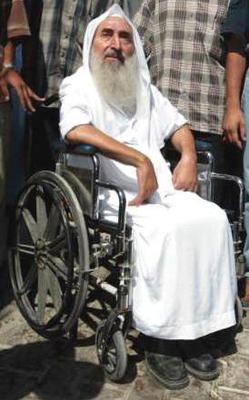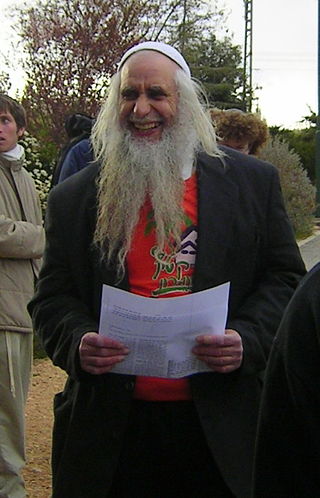
Sheikh Ahmed Ismail Hassan Yassin was a Palestinian politician and imam who founded Hamas, a militant Islamist and Palestinian nationalist organization in the Gaza Strip, in 1987.
Abdel Aziz al-Rantisi was a Palestinian political leader and co-founder of Hamas, along with Sheikh Ahmed Yassin.

The Popular Resistance Committees is a coalition of a number of armed Palestinian groups opposed to what they regard as the conciliatory approach of the Palestinian Authority and Fatah towards Israel.
The Murder of the Hatuel family was a shooting attack on May 2, 2004, in which Palestinian militants killed Tali Hatuel, a Jewish settler, who was eight months pregnant, and her four daughters, aged two to eleven. The attack took place near the Kissufim Crossing near their home in Gush Katif bloc of Israeli settlements in the Gaza Strip during the Second Intifada. After shooting at the vehicle in which Hatuel was driving with her daughters, witnesses said the militants approached the vehicle and shot the occupants repeatedly at close range.
Said Seyam, first name also spelled Saeed and Sayed and last name also spelled Siam, was the interior minister of the Palestinian government of March 2006. He joined Hamas and became one of its top commanders. During the 2008–2009 Gaza War, Seyam was killed in an Israeli airstrike in Jabalia. Seyam was the most senior Hamas member killed in the war, and the most senior Hamas figure killed by Israel since the death of Abdel Aziz al-Rantisi in April 2004.
The History of Hamas is an account of the Palestinian Islamist fundamentalist socio-political organization with an associated paramilitary force, the Izz ad-Din al-Qassam Brigades. Hamas (حماس) Ḥamās is an acronym of حركة المقاومة الاسلامية Ḥarakat al-Muqāwamat al-Islāmiyyah, meaning "Islamic Resistance Movement".
Ahmed al-Jabari was a senior leader and second-in-command of the military wing of Hamas, the Izz ad-Din al-Qassam Brigades. He was widely credited as the leading figure in the Hamas takeover of the Gaza Strip, and commanded the 2006 Hamas cross-border raid which resulted in the capture of Israeli soldier Gilad Shalit. Under his command, along with chief logistics officer Mahmoud al-Mabhouh, Hamas developed its own military weapons capability significantly by acquiring longer-range guided missiles and rockets.

Rabbi Menachem Froman was an Israeli Orthodox rabbi, and a peacemaker and negotiator with close ties to Palestinian religious leaders. A founding member of Gush Emunim, he served as the chief rabbi of Tekoa in the West Bank. He was well known for promoting and leading interfaith dialogue between Jews, Christians and Muslims, focusing on using religion as a tool and source for recognizing the humanity and dignity of all people. Together with a Palestinian journalist close to Hamas, Rabbi Froman drafted a ceasefire agreement between Israel and the Hamas government in the Gaza Strip, known as the Froman-Amayreh Agreement. The agreement was endorsed by Hamas government, but it did not receive any official response from the Israeli government.
Sheikh Radwan is a district of Gaza City located nearly 3 kilometers (1.9 mi) northwest of the city center. It borders al-Shati camp to the southwest, Rimal to the south, and Jabalia to the east. The Sheikh Radwan Cemetery is located in the district. It contains hundreds of graves for Palestinians killed in the Israeli–Palestinian conflict, including Hamas leaders Ahmed Yassin, Abdel Aziz al-Rantissi, and Said Siam.

Egypt–Palestine relations are the bilateral relations between the Arab Republic of Egypt and the State of Palestine. Egyptian President Gamal Abdel Nasser was a strong supporter of the Palestinian cause and he favored self-determination for the Palestinians. Although the Egyptian government has maintained a good relationship with Israel since the Camp David Accords, most Egyptians strongly resent Israel, and disapprove of the close relationship between the Israeli and Egyptian governments.
Events in the year 2004 in the Palestinian territories.
The Beersheba bus bombings were two suicide bombings carried out nearly simultaneously aboard commuter buses in Beersheba, Israel, on August 31, 2004. 16 people were killed and more than 100 were injured. Hamas claimed responsibility for the attacks.

A suicide bombing took place on June 11, 2003, on Egged bus line 14a at Davidka Square in the center of Jerusalem. 17 people were killed in the attack and over 100 people were injured.

The abduction and killing of Nissim Toledano began on 13 December 1992, when a squad of Hamas abducted Israeli border policeman Senior Sergeant Nissim Toledano in Lod, Israel. Although the captors demanded the release of Hamas leader Sheikh Ahmed Yassin for Toledano, Toledano was killed by his captors.
Ismail Abu Shanab was a Palestinian engineer and one of the founders of Hamas. He was one of its three most senior leaders in Gaza. More specifically, he was the second highest leader of Hamas only after Sheikh Ahmed Yassin. He was also the political leader of Hamas, who was strongly against suicide bombings and in favor of a long-term truce.

The prime minister of the Palestinian National Authority was the position of the official head of government of the Palestinian Authority government, which operated between 2003 and January 2013, when it was officially transformed into the State of Palestine. Some still refer to the position of the prime minister of the Gaza Strip as the prime minister of the Palestinian National Authority.

Ahmed Ali Mohammed Qurei, also known by his Arabic name kunyaAbu Alaa, was a Palestinian politician who served as the second Prime Minister of the Palestinian National Authority.

Khaled Mashal is a Palestinian political leader who is the former head of the militant organization Hamas.

The Palestinian Security Services (PSS) are the armed forces and intelligence agencies of the State of Palestine. They comprise several institutions, notably the Security Forces and the Police. The President of the Palestinian National Authority is Commander-in-Chief of the Palestinian Forces.
On the evening of 17 April 2004, the leader of Hamas in the Gaza Strip, Abdel Aziz al-Rantisi, aged 56, was assassinated by missiles fired by Israeli warplanes on the car he was traveling in. In addition two of his bodyguards were killed. The operation was considered part of a campaign to eliminate the leaders of the groups fighting in the uprising. The assassination led to widespread condemnation around the world. Hamas spokesman Ismail Haniyeh vowed to avenge the death, saying the sacrifice would not be in vain.

 Palestinian National Authority – President Yasser Arafat and the executive committee of the Palestine Liberation Organization expressed their profound condemnation of the assassination. They urged all Palestinians to observe a period of mourning lasting three days. In a statement, "President Yasser Arafat and the Palestinian leadership expressed strong condemnation for the assassination of the revered leader, Sheikh Ahmed Yassin, referring to him as a heroic warrior and martyr. They considered this act as a flagrant violation beyond acceptable limits. The Palestinian authorities urged all Palestinians, both within the region and abroad, to observe a three-day mourning period in honor of Sheikh Yassin, who was tragically killed by an Israeli military operation in Gaza." The leadership urged the Palestinians to come together, unite, and foster cohesion. [7] The killing was strongly condemned by Prime Minister Ahmed Qurei. He described it as a "severe and abhorrent act" during a press conference outside Arafat's office in Ramallah. Qurei emphasized that "the purpose behind this action was to perpetuate violence and called upon the Quartet and the United States to put an end to Israel's reckless behavior." He urged them "to recognize the value of Palestinian lives", stating that "enough was enough and that the Quartet and the United States should intervene to halt Israel's irrational conduct."
Palestinian National Authority – President Yasser Arafat and the executive committee of the Palestine Liberation Organization expressed their profound condemnation of the assassination. They urged all Palestinians to observe a period of mourning lasting three days. In a statement, "President Yasser Arafat and the Palestinian leadership expressed strong condemnation for the assassination of the revered leader, Sheikh Ahmed Yassin, referring to him as a heroic warrior and martyr. They considered this act as a flagrant violation beyond acceptable limits. The Palestinian authorities urged all Palestinians, both within the region and abroad, to observe a three-day mourning period in honor of Sheikh Yassin, who was tragically killed by an Israeli military operation in Gaza." The leadership urged the Palestinians to come together, unite, and foster cohesion. [7] The killing was strongly condemned by Prime Minister Ahmed Qurei. He described it as a "severe and abhorrent act" during a press conference outside Arafat's office in Ramallah. Qurei emphasized that "the purpose behind this action was to perpetuate violence and called upon the Quartet and the United States to put an end to Israel's reckless behavior." He urged them "to recognize the value of Palestinian lives", stating that "enough was enough and that the Quartet and the United States should intervene to halt Israel's irrational conduct." Hamas – Abdel Aziz al-Rantisi announced during a public event in Gaza that he is taking on the role of leading Hamas and emphasized the importance of unity, alignment, and staying true to the movement's principles. "We need to come together and stand strong in the trenches of resistance. We will not give up, and we shouldn't, when faced with acts of Zionist terrorism. Sheikh Ahmed Yassin serves as our symbol, and we will follow the same principles and work towards the objectives that Sheikh Ahmed Yassin held dear." [3]
Hamas – Abdel Aziz al-Rantisi announced during a public event in Gaza that he is taking on the role of leading Hamas and emphasized the importance of unity, alignment, and staying true to the movement's principles. "We need to come together and stand strong in the trenches of resistance. We will not give up, and we shouldn't, when faced with acts of Zionist terrorism. Sheikh Ahmed Yassin serves as our symbol, and we will follow the same principles and work towards the objectives that Sheikh Ahmed Yassin held dear." [3]  Israel – Finance minister Benjamin Netanyahu hailed the targeted killing. [5]
Israel – Finance minister Benjamin Netanyahu hailed the targeted killing. [5] 






